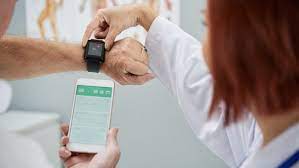
Wearable health tech has been around for a while now tracking various fitness metrics like daily step count and heart rate. However, sophisticated forms of wearable health tech like smart watches have powerful implications in medical care.
Advanced smart watches are embedded with sensors like accelerometers, optical sensors, gyroscopes, contact sensors, ambient light sensors, etc. that enable the recording of sleep data, postures, gestures, pulse, body temperature, etc. When worn daily, these devices collect accurate, real-time data which can later be used to analyze one’s health. Smart watches are user-friendly, easily available, and enable communication between patients and health care providers in case of emergency.
Apple Watch continues to upgrade its health features with its FDA-approved EKG and new blood oxygen measuring functionality. Though, the risk associated with intense integration of health features is that it may cause consumers to over-treat non-existent conditions or prevent them from seeking true medical assessments when needed.


